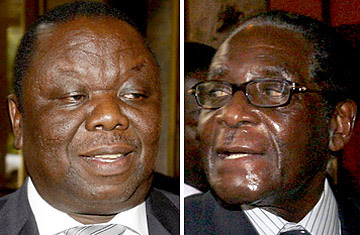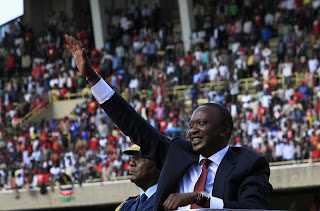Democracy as made in Africa, Zimbabwe sets impractical date
African perspective on retention of sound democratic systems in the continent may be long overdue. After prolonged silence on the Zimbabwe factor Felix Kilonzo turns to the paper two of forced marriage kind of leadership. Kenya and Zimbabwe share a lot in common for the last 30 or so years but of great importance is how the presidency manipulates elections to continue clinching on unpopular power strategy.
Its now official that Zimbabwe goes to polls on July 31 after the Supreme court directed the president to decide on the elections date a move that has attracted the so called ‘rare unity’ among the chief opposition political parties who includes Prime Minister Morgan Tsvangirai of MDC-T and other key political leaders protested the move to near the elections taking in to account the country promulgated a new constitution on May 22.
According to a Zimbabwean newspaper, its reported that on Wednesday five parties – the MDC, led by the prime minister, Morgan Tsvangirai, a breakaway MDC under Welshman Ncube, Mavambo/Kusile/Dawn led by the former government minister Simba Makoni, Zapu and Zanu Ndonga – "expressed reservations about the practicality" of the deadline with many crucial reforms still outstanding.
Under the provisions of the new Zimbabwe constitution the Zimbabwe Elections Council has the mandate to create and maintain voters’ register but it is said the ZEC chair Justice Rita Makarau said that the same is in scrambles.
As a critic of the old guard at the helm of power in Harare I am left wondering, what makes him think he can deliver under the new constitution that he failed to achieve in his 33year rule?
President Mugabe and his peer Museveni promulgated constitutions which had term limits but they ended up vying for presidency beyond the 2 term limits provided for by the supreme law. under the new constitutional order, reforms and integrity are underscored and how will the ZEC conduct its elections given that we have roughly less than 60 days before the historic Zimbabwe elections that shall see the old guard go home peacefully.
I do really endorse free, fair and verifiable elections and when we talk of elections, we mean from the time frame, to the registration, party primaries, publishing names of those cleared to vie, civic education, mock elections to test the systems and finally the actual elections. Freedom of association, movement, expression and the media are important tools of free, fair and verifiable elections and interference of the same means a turn for the worst.
Having elections merely 2 months after promulgating a constitution means the incumbent want to use the same old ways to continue being in power and I criticize the old guard in Harare for what I call selfish agenda that I see it being defeated under the new constitutional order that was voted handsomely by the Zimbabweans in March ending three decades of impunity that existed under the veteran Robert Mugabe.
Human Rights Watch has warned that, as in past elections, the security forces remain loyal to Mugabe and Zanu-PF. It said its investigations found that the Zimbabwean army deployed soldiers across the country, intimidating, beating, and abusing perceived supporters of the MDC or those critical of the government.
"With the security forces right up to the top leaders threatening and attacking Mugabe's perceived opponents, Zimbabweans have little faith in the upcoming elections," said Tiseke Kasambala, Africa advocacy director at the watchdog.
All eyes now remain glued on the dramatic process by Mugabe to sneak himself back to power in an impractical decision to near the elections and the 5-parties are expected to appeal at the Southern African Development Community summit Mozambique on Sunday.
Under section 3 (2) of chapter 1 of the new constitution, the supreme law redefines the principles of governance in Zimbabwe.
It underlines that ‘the principles of good governance, which bind all institutions of the State and government at all levels, include- (a) a multi-party system of democratic government; (b) an electoral system based on universal adult suffrage and free, fair and regular elections to ensure adequate representation of the electorate;’
Section 4.17 articles 1 and 2 gives the Political rights to every citizen in Zimbabwe to ‘free, fair and regular elections for any elective public office established in times of this constitutions or any other law; and to make political choices freely.’
The law farther provides for liberties of forming political parties and movements with reservations to section Chapter 9 of the new constitution.
Its for great importance that the constitution grants non-deprivable rights to form, to join, to participate in the activities of, to recruit members for, a political party or organization of their choice; to campaign for a political party or cause; to participate in a peaceful political activity intended to influence the composition and policies of the government; and to participate individually or through civic organizations, gatherings or groups or in whatever manner, in peaceful activities to influence, challenge or support the policies of the government or any political or whatever cause.
With all the above said, I find the constitutional court which dismissed the application by a civilian to determine how practicable the July date is for credible and verifiable elections. Felix Kilonzo camps there to criticize any move by the ZANU-PF to disrupt the democratic space that is slowly taking shape in Africa.
Its time for a change and no one can hinder that change from happening.
As usual Felix Kilonzo invites comments and interactions on the trending topic via twitter @starkolix or via E-mail Kilonzofelix@gmail.com. Any anonymous comments please email them and I shall treat them as so. Its all about you. Whatsapp me +256782-620-833



Comments
Post a Comment